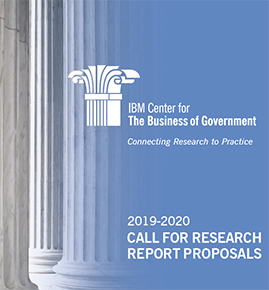
New Research Report Recipients

We are pleased to announce our latest round of stipends for new reports on key public sector challenges, which respond to the priorities identified in the Center's research agenda. Our content is intended to stimulate and accelerate the production of practical research that benefits public sector leaders and managers. We expect the following reports to be published in early 2021.
Creating Public Value with the Internet of Intelligent Things by Gwanhoo Lee, American University
The Internet of Intelligent Things (IoIT) refers to the IoT that is enhanced by the power of Artificial Intelligence/Machine Learning technologies. Although IoIT has great potential for creating public value, its deployment requires a well-formulated implementation strategy and necessary organizational capabilities. By analyzing specific and current use cases in the public domain, this research aims to develop and validate a framework of the four alternative models for creating public value with IoIT. The report will identify critical success factors and best practices for public IoIT, and will also address the privacy and cybersecurity risks associated with IoIT, in making recommendations for government leaders on how best to advance this emerging area of innovation.
Achieving Effective Technology-Oriented Training Outcomes by Stacie Petter, Baylor University and Laurie Giddens, Southern Illinois University Edwardsville
This report will identify recommendations for government agencies to leverage emerging technologies that lead to improved training outcomes. Using findings from research of technology-oriented training programs for law enforcement officers to combat domestic human trafficking, and analyzing similar research from other sectors, recommendations will focus on selecting the right employees to attend training, designing or choosing high-quality training programs, and creating support systems within the agency to enable the employee to apply lessons learned from the training. Illustrative examples and additional recommendations will explain how government agencies can achieve effective technology-oriented training outcomes.
Can the Department of Homeland Security Have Risk-Based Budgets? by Laura Peterson, National Whistleblower Center
This report will assess the Department of Homeland Security's (DHS) work in linking its budget to risk assessment. The report will examine DHS's risk-assessment strategies and how they impact the agency’s budget. It will do so through analysis in several areas, including the Coronavirus pandemic and climate change. The report will look at legislative resources, agency budget justifications, and cross-agency partnership collaborations in reviewing progress around risk-based budgets. The report will offer recommendations for overcoming key policy and financial obstacles to risk-based budgeting in DHS and related agencies.
Enhancing Stakeholder Engagement in Environmental Decision Making through Increased Use of Analytics and AI by Jenna Yeager, Public Lands Foundation
This research effort will examine how federal natural resource management agencies can leverage analytics (including AI) to more effectively engage stakeholders in activities conducted under the National Environmental Policy Act (1976), NEPA. Significant technological advances during the past several years have provided the opportunity for agencies to supplement their traditional analyses with newer, more sophisticated tools, such as location intelligence, cognitive search, text analytics, and sentiment analysis. Using a case study approach, the report will give practical advice on how these new tools can enable more comprehensive, collaborative NEPA stakeholder engagement.
The Role of Community Resilience in Helping to Understand the Challenges of Governance in COVID-19 by Donald F. Kettl, The University of Texas at Austin
The response and recovery efforts to address COVID-19 present the greatest challenge in a generation, and both shares and differs from characteristics of other major crises in recent memory. Understanding the lessons of how local communities are addressing the health, racial and demographic, and economic impacts from COVID-19 can offer valuable clues to governments at all levels for improving the governance of the future crises. The foundation of this approach is community resilience. This special report will draw insights from a blog series that explores a range of issues dealing with COVID-19 and community resilience, including empathy, equity, leadership, collaboration, and resilience. The final report will synthesize the role of community resilience in helping government leaders and stakeholders understand the challenges of governance in COVID-19 and chart the broader lessons learned from current events.



